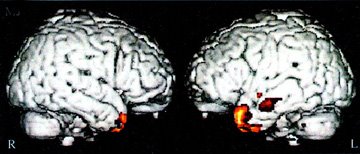Neuroscience
Finally! Was it lost? What is it? Why, it's the brain's concept control core!
But I thought they found it in 1999 or 2000 (Mummery, Patterson, et al.).


Regions of significantly different grey matter density in a
semantic dementia patient (Mummery et al., 1999).
Then the science writer backtracks from the decisive headline (i.e., problem solved), which may not be his fault, and from the first sentence in the article:
References
Davies RR, Hodges JR, Kril JJ, Patterson K, Halliday GM, Xuereb JH. (2005). The pathological basis of semantic dementia. Brain 128:1984-95.
Lambon Ralph MA, Graham KS, Patterson K, Hodges JR. (1999). Is a picture worth a thousand words? Evidence from concept definitions by patients with semantic dementia. Brain Lang 70:309-35.
Jefferies E, Lambon Ralph MA. (2006). Semantic impairment in stroke aphasia versus semantic dementia: a case-series comparison. Brain 129:2132-47.
Mummery CJ, Patterson K, Price CJ, Ashburner J, Frackowiak RS, Hodges JR. (2000). A voxel-based morphometry study of semantic dementia: relationship between temporal lobe atrophy and semantic memory. Ann Neurol 47:36-45.
Mummery CJ, Patterson K, Wise RJ, Vandenbergh R, Price CJ, Hodges JR. (1999). Disrupted temporal lobe connections in semantic dementia. Brain 122:61-73.
Rogers TT, Lambon Ralph MA, Garrard P, Bozeat S, McClelland JL, Hodges JR, Patterson K. (2004). Structure and deterioration of semantic memory: a neuropsychological and computational investigation. Psychol Rev 111:205-35.
Williams GB, Nestor PJ, Hodges JR. (2005). Neural correlates of semantic and behavioural deficits in frontotemporal dementia. Neuroimage 24:1042-51.
- Neuropsychology Shines Torch Through Corridors Of The Mind
Hit the TV. The way it breaks down offers clues as to how it works. For example, you'll never find that a thump causes the screen to selectively stop displaying women, because there's no mechanism in the machine that exclusively supports the transmission...
- Exploring The Library Of The Mind
How is knowledge about the world organised in our minds? Studies with people whose memory has been affected by brain damage, have pointed to a hierarchy of factual, ‘semantic’ knowledge, in which more general information must be accessed first on...
- Neuropsychology Abstract Of The Day: Suicidal Behavior And Semantic Dementia
Suicidal Behavior in Dementia: A Special Risk in Semantic Dementia. American Journal of Alzheimer's Disease and Other Dementias. 2013 Jul 1; Sabodash V, Mendez MF, Fong S, & Hsiao JJAbstractBackground: Some studies report a low suicide risk in general...
- Abstract Of The Day: Mild Cognitive Impairment (mci) & Dementia
Hodges JR, Erzinclioglu S, & Patterson K. Evolution of Cognitive Deficits and Conversion to Dementia in Patients with Mild Cognitive Impairment: A Very-Long-Term Follow-Up Study. Dementia and Geriatric Cognitive Disorders. 2006 Apr 4; 21(5-6): 380-391...
- Abstract Of The Day: Lobar Neurodegeneration
Gorno-Tempini ML, Rankin KP, Woolley JD, Rosen HJ, Phengrasamy L, Miller BL. Cognitive and behavioral profile in a case of right anterior temporal lobe neurodegeneration. Cortex. 2004 Sep-Dec; 40(4-5): 631-44. University of California San Francisco...
Neuroscience
They Found It!
Finally! Was it lost? What is it? Why, it's the brain's concept control core!
But I thought they found it in 1999 or 2000 (Mummery, Patterson, et al.).

Scientists identify brain's concept control coreTo be fair, Lambon-Ralph and his colleagues have done excellent work on semantic dementia for a long time (see refs). He's not responsible for the Reuters article. Here's a better quote:
By Jeremy Lovell
NORWICH (Reuters) - Scientists believe they may have finally identified the part of the brain that deals with the critical issue of matching words to everyday objects.
Using brain scans of people suffering from Semantic Dementia -- the second most common form of dementia after Alzheimer's disease in people under 65 -- they have found that the front end of the temporal lobe seems to be crucial to conceptual application.
"People have been talking about how the brain encodes concepts for 150 years. We believe we have found it," Matthew Lambon-Ralph of Manchester University told the annual meeting of the British Association for the Advancement of Science on Wednesday.
"I have always been fascinated about how the brain gives meaning. We have made some strides toward that," he added.

Regions of significantly different grey matter density in a
semantic dementia patient (Mummery et al., 1999).
Then the science writer backtracks from the decisive headline (i.e., problem solved), which may not be his fault, and from the first sentence in the article:
However, much remains to be discovered about this particular brain function.SUMMARY from The Neurocritic: Another case of "nice finding, but not a topic for the popular press to shout about."
Not only do scientists not know which of the two temporal lobes is involved, they also do not know if other parts of the brain are also part of the conceptual process.
Only when they have discovered the answers to those crucial questions will they be able to work out how they can start to develop therapies to counteract the destructive effects of the progressive disease that eventually kills.
References
Davies RR, Hodges JR, Kril JJ, Patterson K, Halliday GM, Xuereb JH. (2005). The pathological basis of semantic dementia. Brain 128:1984-95.
Lambon Ralph MA, Graham KS, Patterson K, Hodges JR. (1999). Is a picture worth a thousand words? Evidence from concept definitions by patients with semantic dementia. Brain Lang 70:309-35.
Jefferies E, Lambon Ralph MA. (2006). Semantic impairment in stroke aphasia versus semantic dementia: a case-series comparison. Brain 129:2132-47.
Mummery CJ, Patterson K, Price CJ, Ashburner J, Frackowiak RS, Hodges JR. (2000). A voxel-based morphometry study of semantic dementia: relationship between temporal lobe atrophy and semantic memory. Ann Neurol 47:36-45.
Mummery CJ, Patterson K, Wise RJ, Vandenbergh R, Price CJ, Hodges JR. (1999). Disrupted temporal lobe connections in semantic dementia. Brain 122:61-73.
Rogers TT, Lambon Ralph MA, Garrard P, Bozeat S, McClelland JL, Hodges JR, Patterson K. (2004). Structure and deterioration of semantic memory: a neuropsychological and computational investigation. Psychol Rev 111:205-35.
Williams GB, Nestor PJ, Hodges JR. (2005). Neural correlates of semantic and behavioural deficits in frontotemporal dementia. Neuroimage 24:1042-51.
- Neuropsychology Shines Torch Through Corridors Of The Mind
Hit the TV. The way it breaks down offers clues as to how it works. For example, you'll never find that a thump causes the screen to selectively stop displaying women, because there's no mechanism in the machine that exclusively supports the transmission...
- Exploring The Library Of The Mind
How is knowledge about the world organised in our minds? Studies with people whose memory has been affected by brain damage, have pointed to a hierarchy of factual, ‘semantic’ knowledge, in which more general information must be accessed first on...
- Neuropsychology Abstract Of The Day: Suicidal Behavior And Semantic Dementia
Suicidal Behavior in Dementia: A Special Risk in Semantic Dementia. American Journal of Alzheimer's Disease and Other Dementias. 2013 Jul 1; Sabodash V, Mendez MF, Fong S, & Hsiao JJAbstractBackground: Some studies report a low suicide risk in general...
- Abstract Of The Day: Mild Cognitive Impairment (mci) & Dementia
Hodges JR, Erzinclioglu S, & Patterson K. Evolution of Cognitive Deficits and Conversion to Dementia in Patients with Mild Cognitive Impairment: A Very-Long-Term Follow-Up Study. Dementia and Geriatric Cognitive Disorders. 2006 Apr 4; 21(5-6): 380-391...
- Abstract Of The Day: Lobar Neurodegeneration
Gorno-Tempini ML, Rankin KP, Woolley JD, Rosen HJ, Phengrasamy L, Miller BL. Cognitive and behavioral profile in a case of right anterior temporal lobe neurodegeneration. Cortex. 2004 Sep-Dec; 40(4-5): 631-44. University of California San Francisco...
